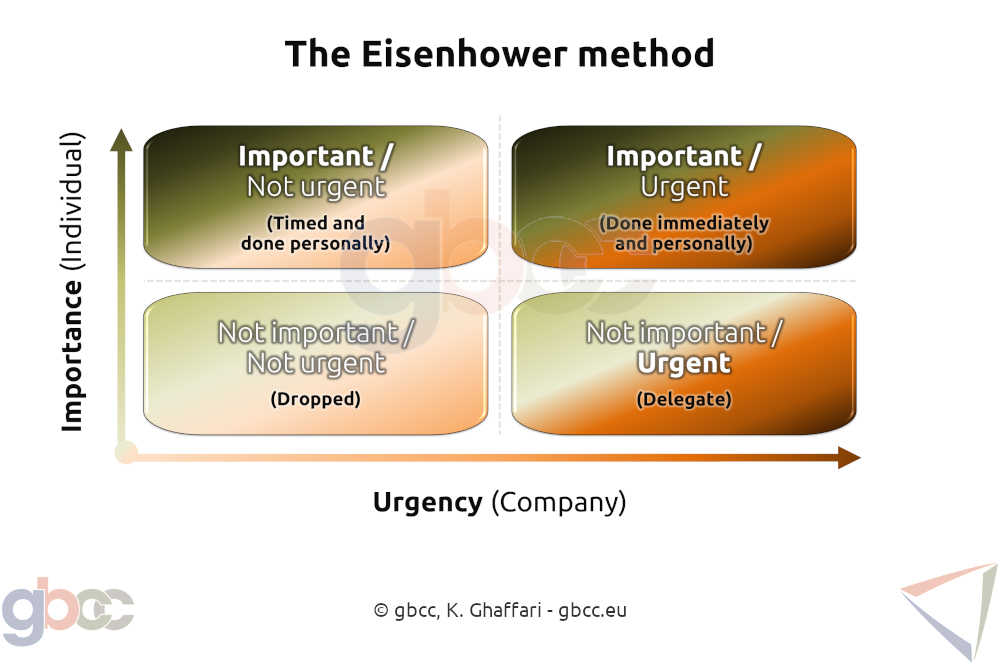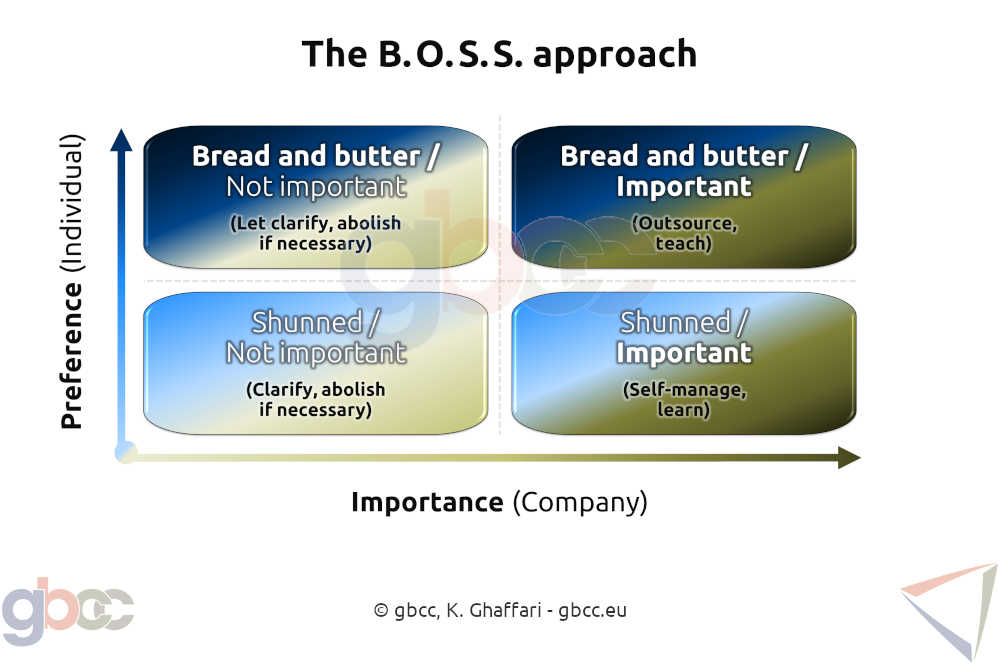Time management: problems arise because you put off important, but not urgent, issues. The B. O. S. S. approach treats the causes instead of the symptoms.
I have been in business for over 30 years and the topic of time management has been with me for almost as long. It was one of the first training measures I received from my first employer.
And over the years, as befitting of large corporate employers, I have met trainers who have been and are still regarded as proven experts in this field.
Sure, the knowledge and tips and tricks they’ve imparted to us as participants were quite useful. Yes, they really know how to “manage” time: they told us how much work they get done over the course of the day, how many meetings they’ve successfully managed and completed, and much more.
Is it an attractive goal to “manage” time?
Putting up with an unpleasant investment phase to be rewarded with an attractive return on investment (ROI) at the end? Yes, I would always be enthusiastic about that, but the ROI that the experts presented to me, and thus implicitly held out the prospect of, was simply not “sexy”.
This was because what bothered me was something else: I perceived the time-management experts as very rushed. I experienced them as reacting to the impulses hitting them from outside.
Rushing from meeting to meeting, managing time, prioritising and working through to-do lists is supposed to be the solution? Terrifying!

„What will be different/better if I am successful in terms of time management?” My own associations with the topic of “time management” were always different, because whenever I asked myself this question, I tended to have the above image in my mind’s eye:
Once I arrive at my destination, I am not rushed by external forces; I am the boss of my own time and am self-determined. I am not reacting but being proactive.
The birth of the B. O. S. S. approach
That being said, I could never really get excited about the topic of time management. It stayed that way until the beginning of May 2020, when I started writing a new compact eBook called „Working together productively – offline or online“. Over the course of preparing to write this book, I naturally researched what people were writing on this topic.
As luck would have it, time management is one of the variables that come up when discussing productivity. That is why I have included a short chapter on it.
Before that, I reviewed my own status quo for a given occasion. That was the birth of the B. O. S. S. approach, which I developed with the support of my wife, for lo and behold, I arrived long ago at my aforementioned goal.
And yet, I have implemented almost nothing of what is recommended in terms of time management. I don’t keep to-do and priority lists and yet I am very rarely under time pressure from outside. I am usually the boss of my own time and am self-determined.
I already felt this way as an executive in a large corporation, as an SME managing director, and also today as a self-employed person:
- I rarely feel deadline stress in my client projects.
- I was/am super punctual when it comes to external appointments – even when there are long traffic jams, when flight check-in takes much longer than usual, or when a train connection is cancelled.
I will describe how I got here. Whether you find the ROI at the end of this journey attractive enough to take the path is, of course, up to you.
To make it easier to convey what I do differently, I start with a very common and popular time management method: the so-called “Eisenhower method“. First, I explain the concept in a few sentences, then I show you why and how I deviate from it.
Time management: The Eisenhower Method
It divides upcoming tasks into four categories, which are aligned along two axes:
- Importance (for the individual)
- Urgency (for the company)

Due to the possible combinations of the two criteria, the four categories result in the following order/weighting (from the individual’s point of view):
- Category 1 – important and urgent: you are to complete this task yourself immediately.
- Category 2 – important, but not urgent: you are to time them and do them yourself later.
- Category 3 – not important, but urgent: you are meant to delegate these to others.
- Category 4 – Not important and not urgent: you should ignore these and thus not process them at all.
That sounds reasonable, doesn’t it? There shouldn’t be any problems, right? Well, the principle may work in a military context with strict hierarchies and chains of command, but I don’t think it can work in a corporate context. Rather, I believe that the concept will cause plenty of consequential problems in companies. To establish the thesis, let me first say a few introductory words:
Regardless of whether you are a department head responsible for a department or a managing director responsible for the entire company, you are always (and at all times) dealing with three subject areas that function according to very different rules:
- Setting goals, coordinating work, taking the lead, and achieving results.
- Turning towards people, recognising their needs, opening up, and building relationships.
- Collecting and evaluating facts, thinking while remaining focused, and striving for insights.
One subject area tends to suit you very much and one tends to not suit you so much. If you are interested, I go into this topic in detail in my eBook called “Sustainable decision-making processes“.
Important tasks
All the tasks that you have to complete can technically be attributed to the above three subject areas. If you have a favourite topic, then it is important to you, and you pay more attention to this topic. You develop a routine and know: “I can do it better and faster than my colleagues”, and “If I do it myself, then I can rely on the result being useful.” The topic gradually evolves into your bread-and-butter tasks.
- Therefore, the Eisenhower method concludes that if the task is important (for you) and urgent (for the company), then you should do it yourself immediately.
However, others notice this behaviour sooner rather than later. They think: “My boss knows everything better anyway. Let them do it themself. It’s not worth giving it a try and getting burnt because the result isn’t good enough for the boss, not to mention thinking along with them and coming up with new ideas”.
- This tends to create a bottleneck in your position as a supervisor. It’s a bit of a self-fulfilling prophecy that ensures that staff come to you for every little thing.
Unimportant tasks
We tend to shun tasks that are not our cup of tea. We don’t feel like giving them a try ourselves. It’s simply no fun for us. The task is left undone, but if it is important for the company, this can lead to bitter consequences.
- The solution of the Eisenhower method: delegate it to others.
The key question here is how do you ensure that the other person actually takes care of the assigned task in a timely manner?
And where do you find the time to monitor the employee?

With the Eisenhower “solution”, you thus set off a chain of new problems. First and foremost, since you have no useful experience of your own, you have no suitable basis for measuring performance and are therefore at the mercy of the actions of the person in charge. You can then only hope that they know what they are doing.
- If not, then you’re unlucky and lose out.
You would probably not believe how many managing directors I have met over the years who do not have the slightest idea about accounting or the like. They blindly rely on their accountants and/or tax advisors. They are then bewildered when
- Due to the amateur work of others, it is they themselves who suddenly have one foot in jail because they have allegedly delayed filing for bankruptcy, or
- Money has been embezzled over the years.
Do I recognise the consequences of my incompetence?
Another phenomenon also goes hand in hand with this topic: the so-called Dunning-Kruger effect! The social psychologists David Dunning and Justin Kruger had noticed in their studies that if one has a little competence in a subject, then
- One tends to overestimate one’s own abilities,
- Not recognise superior abilities in others, and
- Cannot correctly assess the extent of one’s own incompetence.
Should you really ignore unimportant and non-urgent tasks?

Lastly, let’s have a look at one of the mantras in time-management literature: ignore unimportant and non-urgent tasks.
This always made me shake my head in disbelief because it is simply not compatible with reality, which is:
Issues we ignore regularly blow up in our faces.
Time management: The B. O. S. S. approach:
Having said this, I recommend a contrasting approach: bread-and-butter tasks need to be outsourced, shunned tasks need to be self-managed – B. O. S. S.!

Bread-and-butter tasks
Investment: to start reaping the benefits of a more balanced workload, you should start outsourcing the tasks that you are comfortable with, your bread-and-butter tasks, so to speak.
You can set up well-thought-out processes and contingency plans as you have the knowledge and experience needed to do so.

You can contribute your own knowledge which will ensure knowledge is transferred and will help to encourage employees to think and act independently.
- ROI: if you have established clear, detailed processes and contingency plans, and you have taught your colleagues the necessary tools, you can then relax and cherry-pick which tasks you take on.
Shunned tasks

Investment: you yourself should first take care of the issues that are important for the company, but you would rather shun as they are not your preferred choice.
Gradually, you will learn and develop a sense of how to recognise below or above average performance on these points.
- ROI: after that you can relax and outsource the activity.
Incidentally, this was also one of the insights Dunning and Kruger gained from their studies: less competent people can indeed not only increase their competence through education or practice, but also learn to better assess themselves and others.
Important but not urgent? Do it pronto!
Investment: all issues that are important for the company, but are not urgent (Eisenhower category 2), should be treated as if they were extremely urgent.
I handle it like this: if, for example, I have a client workshop in three months and a week’s preparation time, then I must be prepared in one week from today – at the latest!
During this preparation time, if I have the capacity to do so, I might choose to work a lot and maybe even late into the night just to finish the task quickly and get it out of my head.
Mind you, this is not external pressure due to a deadline or third-party requirements. This is a positive pressure from within that ensures that I perform.

And I can take a relaxed break from work at any time, for a client or for my family, because I know nothing bad will happen.
I can then use the time until the workshop to
- Refine what I’ve prepared and/or
- To design and organise everything calmly so that the workshop can be held by any other person in my team if necessary. This is my preferred choice.
Yes, it can happen that the workshop is cancelled at short notice, and the preparation was supposedly done in vain. But this notion is not even remotely as bad as this one: being repeatedly faced with the situation where I must prepare in a hurry, and at the last minute, until late into the night the night before.
- ROI: since you finished the task in advance, you can react in a relaxed manner to unexpected developments. Eisenhower category 1 “important and urgent” is therefore extremely rare for you!
Taking the time to clarify issues that are not important
Investment: that is why I have and am taking the time to take care of the Eisenhower category 4 “not important and not urgent” straight away. Ignore them? Heck no!
An issue that’s not important for me but is important for the company? So why am I responsible for it and not the employee in charge?
- This is a significant indication that I have failures in clarifying the responsibilities of my staff.
The issue is neither important to me nor to the company? Why does the issue exist then?
- This is a significant indication of failures in the company’s mission statement and/or the expectation management has towards customers.
Any tasks that you perceive as not important (to the company) should be looked at more closely to ensure that you are not inadvertently overlooking an important component. If the clarification does reveal that they are not important to the company, you should strive to eliminate them altogether.
- This may include a marketing campaign that you inherited from your predecessor, but which no longer fits the company’s goals.
- Or a time-consuming, supplementary, free-of-charge service that was previously introduced for a very important customer and is still continued today, even though the current business volume no longer justifies this free supplementary service.
However, if you yourself have a soft spot for an unimportant task, then you are well advised to delegate the clarification and, if necessary, abolition to someone else.
- ROI: the most important insights for optimising internal processes and market presence often comes from consciously addressing category 4.
Conclusion: time management according to the B. O. S. S. approach versus the Eisenhower method
I’m afraid with the Eisenhower method, the time component is ultimately the yardstick that drives you to act as an individual: you only deal with issues when they have become urgent. Then you pick and choose which of them you want to deal with yourself, and someone else will take care of the other tasks – or not.
I, on the other hand, see the time component as merely a symptom that arises because responsibilities are not clarified, and you put off dislikeable tasks. In my time management philosophy, therefore, the importance of a task becomes the yardstick that moves you as an individual to act: if you make sure that the person responsible is clearly identified and that they take care of these tasks early on, you prevent them from ever becoming urgent.

